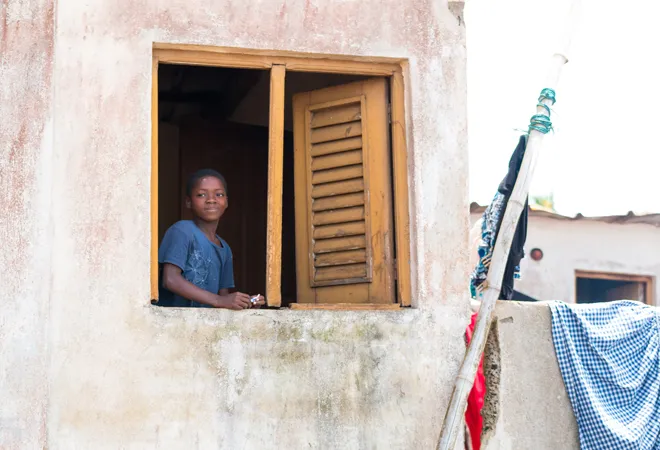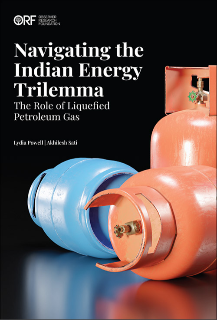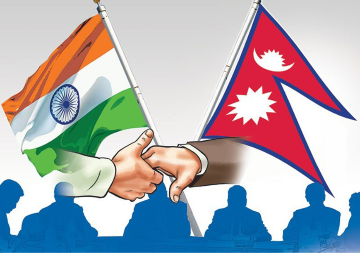
After a gap of seven years, India, Brazil and South Africa took the initiative to revive the Trilateral IBSA Dialogue Forum on the sidelines of second BRICS Foreign Ministers’ meeting held on 4 June, 2018 in Pretoria, South Africa. On 5 June, during the 8
th Trilateral Ministerial Commission meeting, India’s External Affairs Minister Sushma Swaraj, South Africa’s Minister of International Relations and Cooperation of Republic Lindiwe Sisulu and Brazil’s Deputy Minister of Foreign Affairs Marcos Bezerra Abbott Galvao released the IBSA declaration on ‘South-South’ Cooperation which aimed to forge a better understanding of development cooperation as a common endeavour between the countries of the Global South.
Established in June 2003, the IBSA Dialogue Forum brings together three large democracies and major economies from three different continents i.e. Asia, Africa and South America, facing similar developmental challenges. India, Brazil and South Africa represents three developing, pluralistic, multicultural, multi-ethnic, multilingual and multi-religious nations. The three countries share a common vision that democracy and development is interlinked, mutually reinforcing and is essential for achieving sustainable peace and stability.
Established in June 2003, the IBSA Dialogue Forum brings together three large democracies and major economies from three different continents i.e. Asia, Africa and South America, facing similar developmental challenges.
Cooperation in IBSA takes place on three fronts; as a forum to coordinate and consult on global and regional political issues, as a trilateral collaboration on detailed areas and projects through working groups and people-to-people forums, and by funding projects through the IBSA Fund to assist other developing countries. The forum’s 2007 Tshwane declaration and 2008 Delhi declaration called for greater cooperation between the countries of the global South, guided by the principles of equality, economic and political non-conditionality, mutual benefit, and non-interference in each other’s domestic affairs.
Till date, five IBSA summits have taken place; Brasilia 2006, Tshwane 2007, New Delhi 2008, Brasilia 2010, Tshwane 2011. New Delhi was scheduled to hold the sixth summit in 2013 to mark the forum’s 10
th anniversary. Unfortunately, the
meeting did not materialise due to ‘scheduling’ issues, which led to the postponement of the summit, thereby raising questions on its significance. However, with the recent meet in Pretoria, India Brazil and South Africa have re-affirmed their commitment to work together as equal partners for the mutual benefit of their people.
A new partnership based model for development
The idea of South-South Cooperation (SSC) is not new. Its genesis can be traced back to the decades of efforts by countries and groupings working together to ensure South-South solidarity such as Bandung conference 1955, Non-Aligned Movement 1961, G77 grouping, UNCTAD, the Buenos Aires Plan of Action 1978, and the 2009 Nairobi declaration. Development cooperation among IBSA members is guided by the spirit of South-South Cooperation.
The idea of South-South Cooperation is not new. Its genesis can be traced back to the decades of efforts by countries and groupings working together to ensure South-South solidarity.
The 2010 IBSA Brasilia declaration contains the fundamental premise and principles to guidedevelopment cooperation among countries of the global South. As a common endeavour of peoples and countries in the global South, the SSC is a new ‘partnership’ model, one which is based among equals. The model isguided by principles of respect for national sovereignty, national ownership and interdependence. The Brasilia declaration rejected terming development cooperation under SSC as ‘aid’, and also rejected the donor-recipient paradigm.
Guided by the spirit of sharing and solidarity, IBSA funded projects are demand-driven. The priorities set out in the projects are determined by partner countries and the relevant stakeholders are actively involved in the project initiation, implementation and delivery process. There is also a firm belief that the primary responsibility towards development lies with the states under their own leadership and ownership. By enhancing capacity building and technology transfers, SSC aims to create higher levels of capabilities and economic opportunities.
Outcomes
Increasingly, a particular emphasis is laid on differentiating North-South cooperation from South-South cooperation. While Overseas Developmental Assistance (ODA) is obligatory on states, SSC is voluntary in nature. At the 2002 Monterrey consensus and 2008 Doha declaration, the global North/developed countries agreed to commit 0.7% GNI as ODA. Even the 2015 Addis Ababa Action agenda stressed on measures to make finance available in order to achieve 2030 Agenda and realise Sustainable Development Goals (SDGs). Therefore, in order to fast-track the process, IBSA member states’
called upon the global North to honour its ODA commitments fully, to scale up their existing resources, and to commit additional resources. This new partnership based model is not a substitute to North-South cooperation. Rather, it serves as a compliment to North-South cooperation.
In order to achieve sustainable development, an equal and balanced emphasis must be placed on social, economic and environmental aspects. Furthermore, SSC does not imply a reduction in responsibilities of developed countries with respect to their ODA commitments, new and additional financing, and provision of means of implementation to achieve the goals of Paris Agreement on Climate Change. The countries under SSC are guided by the 2015 Rio principle of Common but Differentiated Responsibilities and Respective Capabilities (CBDR-RC) which acknowledges different capabilities and differing capacities of individual countries in addressing climate change.
In order to achieve sustainable development, an equal and balanced emphasis must be placed on social, economic and environmental aspects.
Funding mechanisms
In March 2004, the IBSA Facility for Poverty and Hunger Alleviation (IBSA Fund) was established which became operational in 2006. Together in partnership with the UN, it works to assist other developing countries, particularly Least Developed Countries (LDCs) and Post Conflict Reconstruction and Development (PCRD)countries around the world with
62.4 percent of IBSA fund being devoted to the LDCs.
The fund helps to facilitate execution of human development projects in order to fight poverty and hunger in developing countries. The fund is managed by UN Office for South-South Cooperation (UNOSSC). Each IBSA member country is
required to contribute $1 million per annum to the fund. Over the years, the fund has contributed $39 million and partnered in 19 countries from global South to implement 26 projects. Projects have been funded in countries such as Guinea Bissau, Sierra Leone, Cape Verde, Burundi, Cambodia, Haiti, Palestine, Vietnam and others. The fund has also been recognised for its good work in the field and has received UN South-South Partnership award 2006, UN MDG award 2010, and the South-South and Triangular Cooperation Champions award in 2012.
Challenges and future areas of cooperation
Over the years, IBSA has emerged as an effective grouping of like-minded democracies cooperating together in diverse sectors such as global governance, disarmament, non-proliferation, health, climate change, trade and development, intellectual property, education, human rights and tourism. Although considerable progress has been made both in-terms of its commitments and implementation of projects, the grouping faces a fundamental challenge; How to maintain its relevance in the wake of the emergence of similar groupings such as BRICS.
To overcome this challenge, IBSA member states must ensure regular meets both at the level of Heads of State and Government, as well at the Ministerial level. Working collectively towards ensuring the MERCOSUR-SACU-India Trilateral PTA first, and eventually a Free Trade Area (FTA), will go a long way in ensuring the groupings relevance. The grouping must work together as a joint lobby in other groupings of which they are members of, such as BRICS and G20.
India, Brazil and South Africa have serious aspirations to become permanent members of UNSC. Restructuring the institutions of global governance is necessary in order to reflect the changing realities in a globalised world.
A significant emphasis is being placed by on issues of global governance. To this end, reforming institutions such as United Nations Security Council (UNSC), IMF etc. is a necessary pre-requisite to forge consensus behind the principle of economic development among developing countries. India, Brazil and South Africa have serious aspirations to become permanent members of UNSC. Restructuring these institutions of global governance is necessary in order to reflect the changing realities in a globalised world. The international financial architecture needs to be restructured as it directly affects the welfare of people, particularly older persons, youths, and the family and persons with disabilities.
Time and again, leaders from the global South have
reaffirmed that people comes first and they should actively participate in the formulation and implementation of public policies, allowing for free, fair, and sustainable development. This ‘people centric’ approach is what defines and sets South-South cooperation apart from other partnership models, and is reflected in the 2011 Tshwane declaration. This particular focus on people-centric social policies is what will help in accelerating the restructuring of international financial architecture and reforming institutions of global governance.
An important component of development cooperation is financing. At various times, funds often face the risk of misappropriation, mishandling and theft. Therefore, in order to prevent this, it is necessary to maintain a strict vigilance over funds to ensure effective and responsible financing.
IBSA, marking 15
th anniversary this year, has been the launching pad for its member-states ascent in the global hierarchy. The forum continues to be a motor for global institutional reforms in the future, striving collectively to establish a rules-based and transparent international trading and finance system. By offering a new partnership based model for development cooperation, the forum has taken a giant step towards accelerating the development agenda of the global South. The task at hand for its member states is to coordinate efforts through their multilateral missions, follow up on proposed events and identify new avenues of cooperation in the run up to 9
th trilateral ministerial meeting scheduled to be held later this year — on 28 September in New York.
The views expressed above belong to the author(s). ORF research and analyses now available on Telegram! Click here to access our curated content — blogs, longforms and interviews.



 After a gap of seven years, India, Brazil and South Africa took the initiative to revive the Trilateral IBSA Dialogue Forum on the sidelines of second BRICS Foreign Ministers’ meeting held on 4 June, 2018 in Pretoria, South Africa. On 5 June, during the 8th Trilateral Ministerial Commission meeting, India’s External Affairs Minister Sushma Swaraj, South Africa’s Minister of International Relations and Cooperation of Republic Lindiwe Sisulu and Brazil’s Deputy Minister of Foreign Affairs Marcos Bezerra Abbott Galvao released the IBSA declaration on ‘South-South’ Cooperation which aimed to forge a better understanding of development cooperation as a common endeavour between the countries of the Global South.
Established in June 2003, the IBSA Dialogue Forum brings together three large democracies and major economies from three different continents i.e. Asia, Africa and South America, facing similar developmental challenges. India, Brazil and South Africa represents three developing, pluralistic, multicultural, multi-ethnic, multilingual and multi-religious nations. The three countries share a common vision that democracy and development is interlinked, mutually reinforcing and is essential for achieving sustainable peace and stability.
After a gap of seven years, India, Brazil and South Africa took the initiative to revive the Trilateral IBSA Dialogue Forum on the sidelines of second BRICS Foreign Ministers’ meeting held on 4 June, 2018 in Pretoria, South Africa. On 5 June, during the 8th Trilateral Ministerial Commission meeting, India’s External Affairs Minister Sushma Swaraj, South Africa’s Minister of International Relations and Cooperation of Republic Lindiwe Sisulu and Brazil’s Deputy Minister of Foreign Affairs Marcos Bezerra Abbott Galvao released the IBSA declaration on ‘South-South’ Cooperation which aimed to forge a better understanding of development cooperation as a common endeavour between the countries of the Global South.
Established in June 2003, the IBSA Dialogue Forum brings together three large democracies and major economies from three different continents i.e. Asia, Africa and South America, facing similar developmental challenges. India, Brazil and South Africa represents three developing, pluralistic, multicultural, multi-ethnic, multilingual and multi-religious nations. The three countries share a common vision that democracy and development is interlinked, mutually reinforcing and is essential for achieving sustainable peace and stability.
 PREV
PREV


